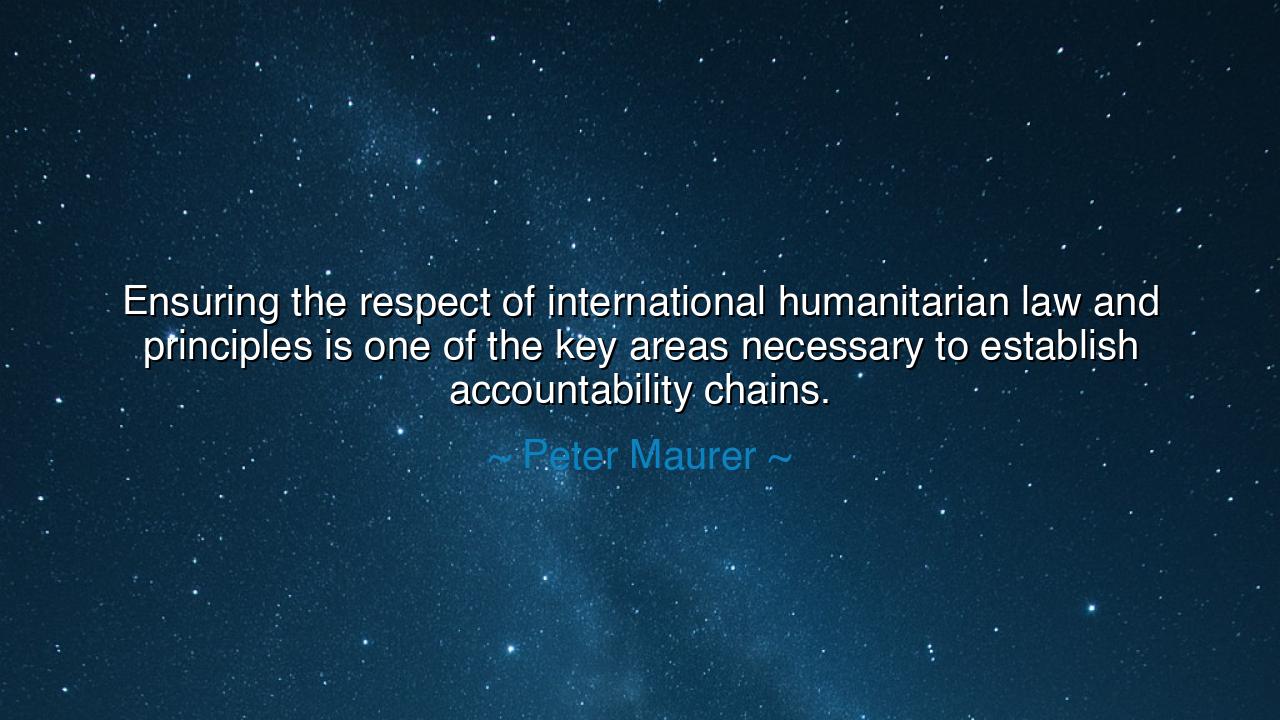
Ensuring the respect of international humanitarian law and
Ensuring the respect of international humanitarian law and principles is one of the key areas necessary to establish accountability chains.






When Peter Maurer declared, “Ensuring the respect of international humanitarian law and principles is one of the key areas necessary to establish accountability chains,” he was not merely voicing the language of diplomacy; he was speaking with the gravity of ages past, where the cries of the innocent echoed across battlefields and the need for justice became eternal. His words summon us to remember that in war, without law, there is only ruin; without principle, there is only savagery; without accountability, there is only silence after the slaughter.
The respect of international humanitarian law is more than the observance of treaties written on paper; it is the recognition of humanity even amidst conflict. These laws were born out of centuries of carnage—born from the fields of Solferino, where blood and suffering gave birth to the Red Cross; born from the horrors of two world wars, when the dignity of the human person demanded protection even in the darkest hours. Maurer, as steward of these principles, calls us back to this sacred covenant: that even when nations clash, there must be boundaries, so that life, dignity, and mercy do not perish entirely from the earth.
The phrase “accountability chains” carries with it the weight of order, justice, and memory. Chains bind together, link after link, ensuring that responsibility is not lost in the fog of war. Without such chains, crimes vanish into dust, the powerful walk unpunished, and the victims are forgotten. But with them, each action is tied to a hand, each decision to a name, each crime to a reckoning. In this, Maurer echoes the wisdom of the ancients: justice must not be abstract, but tangible, so that the oppressor cannot hide behind the veil of chaos.
History itself speaks to this truth. After the Second World War, the Nuremberg Trials stood as a monumental effort to create such accountability chains. Leaders who unleashed war and orchestrated atrocities were forced to answer before the world, not only as generals and politicians, but as men. Their judgments made clear: even in war, there are limits, and those who cross them will stand before the bar of history. Nuremberg was not perfect, but it planted a seed—an example that law must not perish, even when bombs fall.
Yet Maurer’s words also carry a warning. To “ensure respect” is not a passive hope, but an active struggle. Respect does not blossom automatically; it must be demanded, enforced, cultivated. Where governments seek advantage over principle, where armies prioritize power over mercy, the fragile structures of humanitarian law are trampled. The lesson is clear: laws unguarded are laws undone, and principles ignored are principles destroyed. Respect is the lifeblood of justice, and without it, accountability chains break.
For us, the teaching is profound. Though we may not be lawmakers or generals, we are all custodians of respect in our own realms. In families, in communities, in workplaces, we too must uphold principles that guard the dignity of others. If we neglect these, if we excuse cruelty, if we allow injustice to pass unchecked, then we weaken the very chains of accountability that preserve peace. Justice begins in the small, and grows into the great.
Practical wisdom follows: stand firm for principles in times of conflict, even when silence is easier. Support institutions that defend humanitarian law. Educate yourself and others about the sacred limits that preserve dignity in war and in peace. And in your own life, practice accountability—own your actions, admit your faults, honor your commitments. For the same principle that preserves nations preserves the soul: respect for law, respect for principle, respect for humanity itself.
Thus Maurer’s words endure as a call across generations. Respect, principle, accountability—these are not the tools of the weak, but the weapons of the just. Let us ensure their survival, not only in treaties and courts, but in our lives and choices. For in doing so, we honor the memory of those who suffered, protect those who live, and prepare a world more just for those yet to come.






AAdministratorAdministrator
Welcome, honored guests. Please leave a comment, we will respond soon